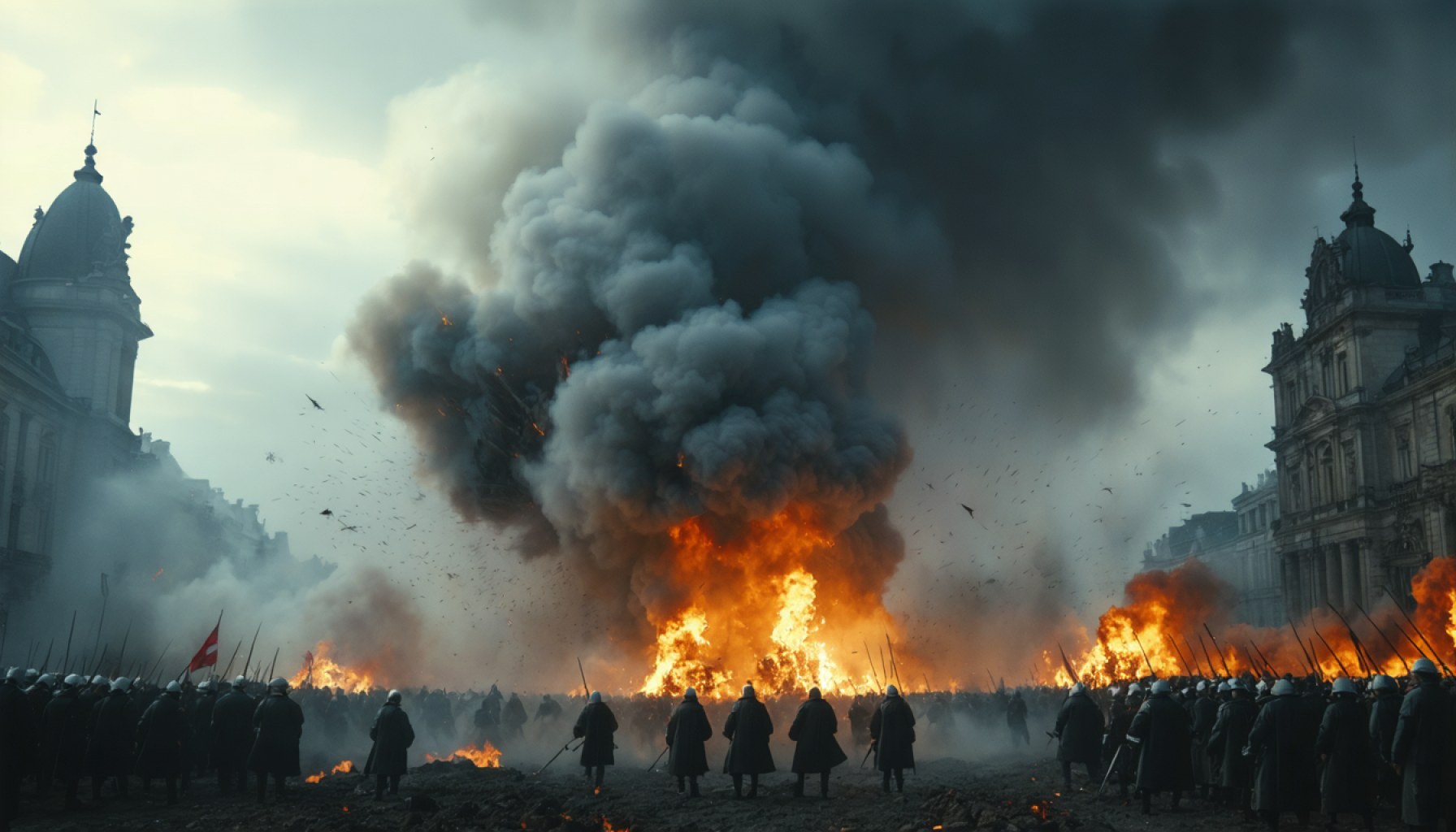- Friedrich Merz and Olaf Scholz vie for leadership as key political figures in Germany.
- Merz, known for his impulsive nature, adopts a more statesman-like appearance in the campaign.
- Scholz sheds his low-key demeanor, unveiling a bold approach to the political arena.
- The campaign is documented by filmmakers Mathis Feldhoff and Andreas Huppert, capturing their transformations.
- Merz’s journey from political sidelining to a dramatic comeback highlights his extensive experience in politics and business.
- Scholz draws from his experience as Minister and First Mayor, navigating challenges as Chancellor under a coalition government.
- Both leaders seek to define their visions for Germany’s future amid fluctuating polls and approval ratings.
- The political drama explores the stakes of Germany’s future leadership and strategic fortitude of each candidate.
A political saga unfolds as Friedrich Merz and Olaf Scholz clash, each aiming to lead Germany into its future. The spotlight captures Merz, traditionally seen as impetuous, adopting a statesman-like veneer. Meanwhile, Scholz unveils a surprisingly bold stance, shaking off his usual low-key demeanor. The stage is set for a riveting showdown, chronicled by filmmakers Mathis Feldhoff and Andreas Huppert.
As the campaign gains momentum, these candidates transform before the cameras. Merz, who ascended through party ranks only to be sidelined by Angela Merkel, re-emerges stronger, embodying a comeback narrative most dramatic. His past experience as a European and Bundestag parliamentarian, followed by years in the corporate realm, adds layers to his political revival.
On the other side, Scholz wears the scars of experience from his time as Minister and First Mayor of Hamburg, stepping into the national spotlight during an often tumultuous tenure as Chancellor under the first Ampelkoalition with SPD, Greens, and FDP. His resolve is tested as he navigates a landscape where his popularity wavers perilously.
The documentary accompanies Merz and Scholz through the trials of campaign events across Germany, with each leader striving to define a vision for the nation’s future. As party allies weigh in on their strengths and vulnerabilities, the narrative questions who possesses the strategic fortitude to carry Germany forward.
Merz battles to sustain a lead in polls, haunted by past electoral missteps, whereas Scholz, undeterred by low approval ratings, seeks a miraculous turnaround. In this gripping political drama, the stakes are colossal, with Germany’s destiny hanging in the balance. Will the established pragmatist or the comeback contender prevail? Only the forthcoming electoral fates will reveal the outcome.
Germany’s Political Face-Off: A Saga of Power, Strategy, and Destiny
How-To Steps & Life Hacks for Political Campaigns
1. Craft a Unique Narrative: Both Friedrich Merz and Olaf Scholz exemplify the power of storytelling in politics. Merz’s comeback narrative and Scholz’s perseverance highlight the need to resonate with personal stories.
2. Engage with Various Media: As showcased by the documentary, leveraging diverse media platforms can reinforce a candidate’s image. Invest in digital media, televised debates, and community outreach.
3. Adapt Leadership Style: Merz’s transformation from impetuous to a statesman-like figure teaches candidates the importance of adapting their public persona to appeal to a broader electorate.
4. Mobilize Party Support: Both leaders actively engage their party members, emphasizing internal cohesion, which helps in dealing with public scrutiny and policy debates.
Real-World Use Cases of Political Strategies
– Comeback Strategies: Merz’s rise from sidelines after Merkel to pivotal leader illustrates the effectiveness of maintaining visibility through party activities and leveraging past experience.
– Popularity Management: Scholz manages fluctuating approval ratings by addressing public concerns directly and demonstrating leadership resilience during crises, useful for leaders in similar situations.
Market Forecasts & Industry Trends
– Election Trends: According to surveys like those by Infratest Dimap, political landscape predictions suggest growing importance of coalition-building in European politics, especially in multi-party systems like Germany’s.
Reviews & Comparisons
– Merz vs. Scholz Leadership Styles: Analysis from political experts like those at Die Zeit reveals Merz’s corporate background helps in economic debates, while Scholz’s government experience aids in policy governance.
– Global Influence: As EU policy drivers, their global strategy impacts international relations, highlighting Germany’s role as a pivotal power in Europe.
Controversies & Limitations
– Media Scrutiny: Both candidates face intense media scrutiny, with critics pointing to potential biases in media coverage impacting public perception.
– Historical Challenges: Merz’s alignment with conservative policies and Scholz’s ties to past controversies like the Wirecard scandal emerge as focal limitations in their campaigns.
Features, Specs & Pricing of Political Campaigns
– While the political campaign specifics like budgets are closely guarded, historic spending insights, such as 2017’s Bundestag election campaign costing around €92 million, provide a glimpse into resource allocation.
Insights & Predictions
– Election Outcomes: Analysts like those from the European Council on Foreign Relations predict that regardless of who wins, coalition dynamics will heavily influence the next German government’s policies.
Tutorials & Compatibility
– Effective Campaign Management: Online tools such as NationBuilder and Vocus can streamline campaign logistics, useful for teams seeking digital solutions for data analytics and voter outreach.
Pros & Cons Overview
– Merz: Pros include a strong economic focus and fresh leadership approach. Cons involve controversial past statements and a struggle to connect with younger voters.
– Scholz: Pros include extensive government experience and adept crisis management. However, low charisma and past controversies present challenges.
Actionable Recommendations
– For Candidates: Embrace transparency to counter media biases and leverage grassroots support to bolster public engagement.
– For Voters: Stay informed through multiple sources and critically assess each candidate’s policies in relation to your values and priorities.
Quick Tips for Political Engagement
– Stay Informed: Regularly check top-tier journalism sources such as BBC News for balanced political updates.
– Active Participation: Engage in community discussions and forums to deepen understanding of political landscapes.
By focusing on these strategies and insights, both political figures and engaged citizens can effectively navigate the intricate world of political campaigns and governance.
